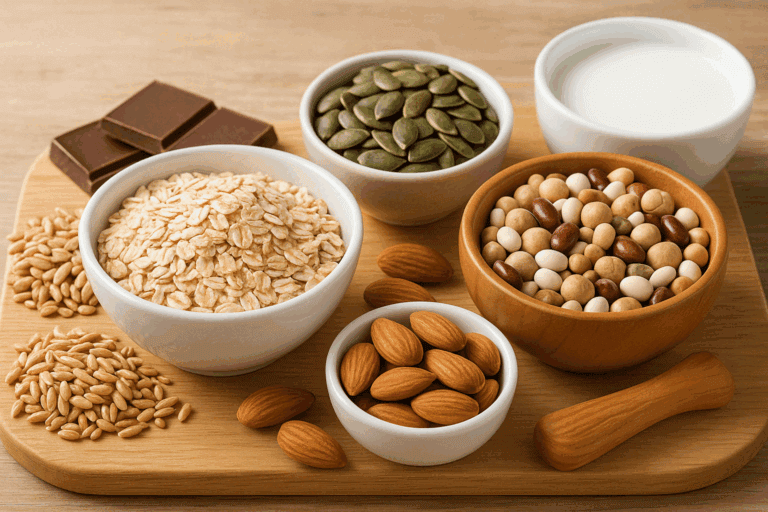In today’s fast-paced world, maintaining proper nutrition is more important than ever—especially for adults aged 40 and above. One key nutrient often overlooked is magnesium. Despite being essential for over 300 bodily functions, many people fall short of their daily magnesium intake.
In this article, we’ll explore the top magnesium rich foods, why you need magnesium, symptoms of deficiency, and how you can incorporate these natural sources of magnesium into your everyday meals.
🧠 Why Is Magnesium Important?
Magnesium supports:
- Muscle and nerve function
- Energy production
- Heart rhythm stability
- Bone health
- Blood sugar regulation
- Better sleep quality
⚠️ Symptoms of Magnesium Deficiency
If you’re low on magnesium, you may experience:
- Muscle cramps or spasms
- Fatigue
- Poor sleep
- Irregular heartbeat
- Numbness or tingling
- Anxiety or mood swings
People over 50 are more likely to develop a deficiency due to reduced absorption and higher nutritional needs.
🥦 Top 10 Magnesium Rich Foods to Add to Your Diet
Let’s dive into the best foods for magnesium that are easy to include in your daily routine.
1. Spinach
- Magnesium content: 1 cup cooked = 157 mg
- Rich in iron and antioxidants
- Easy to add to smoothies, soups, and sautés
2. Pumpkin Seeds
- Magnesium content: 1 oz = 168 mg
- Also high in zinc and healthy fats
- Perfect as a snack or salad topper
3. Almonds
- Magnesium content: 1 oz = 80 mg
- Great for heart and brain health
- Add to oatmeal or eat on the go
4. Black Beans
- Magnesium content: 1 cup cooked = 120 mg
- Loaded with fiber and protein
- Ideal in burritos, soups, or side dishes
5. Avocados
- Magnesium content: 1 medium = ~58 mg
- Contains heart-healthy fats and potassium
- Spread on toast or blend into smoothies
6. Dark Chocolate (70%+ Cocoa)
- Magnesium content: 1 oz = 64 mg
- Packed with antioxidants
- Choose unsweetened or low-sugar versions
7. Bananas
- Magnesium content: 1 medium = ~32 mg
- Easy and portable snack
- Also rich in potassium and vitamin C
8. Tofu
- Magnesium content: ½ cup = 37 mg
- Excellent plant-based protein
- Great in stir-fries or grilled
9. Whole Grains (e.g., Brown Rice, Quinoa)
- Magnesium content: 1 cup cooked brown rice = 86 mg
- Also high in fiber and B vitamins
- Substitute for white rice or pasta
10. Yogurt (Low-Fat or Greek)
- Magnesium content: 1 cup = 47 mg
- Boosts gut health
- Add fruit or seeds for extra nutrients
🥗 How to Add Magnesium Boosting Foods to Your Meals
Breakfast
- Oatmeal with almonds and bananas
- Smoothie with spinach and yogurt
Lunch
- Quinoa salad with avocado and black beans
- Whole grain sandwich with tofu or turkey
Dinner
- Brown rice stir-fry with tofu and veggies
- Baked salmon with spinach and sweet potatoes
Snacks
- Pumpkin seeds
- Dark chocolate square
- Greek yogurt with fruit
👨⚕️ How Much Magnesium Do You Need?
| Age Group | Recommended Daily Intake |
|---|---|
| Adults (31-50) | 320–420 mg |
| Adults (50+) | 320–420 mg |
Tip: Speak to your doctor before starting supplements—whole foods are always best when possible.
❓ FAQ Section: Magnesium Rich Foods for Middle to Older Adults
Q1. Why do older adults need more magnesium?
As we age, magnesium absorption decreases, and medications may interfere with magnesium levels. This makes it essential for seniors to consume magnesium rich foods regularly.
Q2. Can I get enough magnesium through food alone?
Yes, many people can meet their daily needs with a balanced diet. Focus on natural sources of magnesium like leafy greens, nuts, seeds, and whole grains.
Q3. What’s the best time to eat magnesium rich foods?
Magnesium rich foods can be eaten any time, but spreading them throughout the day helps with absorption and reduces stomach discomfort.
Q4. Are magnesium supplements safe for seniors?
Supplements are safe in proper doses, but it’s best to consult a healthcare provider—especially if you’re on medications or have kidney issues.
Q5. Can magnesium help with sleep and anxiety?
Yes, magnesium plays a role in calming the nervous system and may improve sleep quality and reduce stress.


